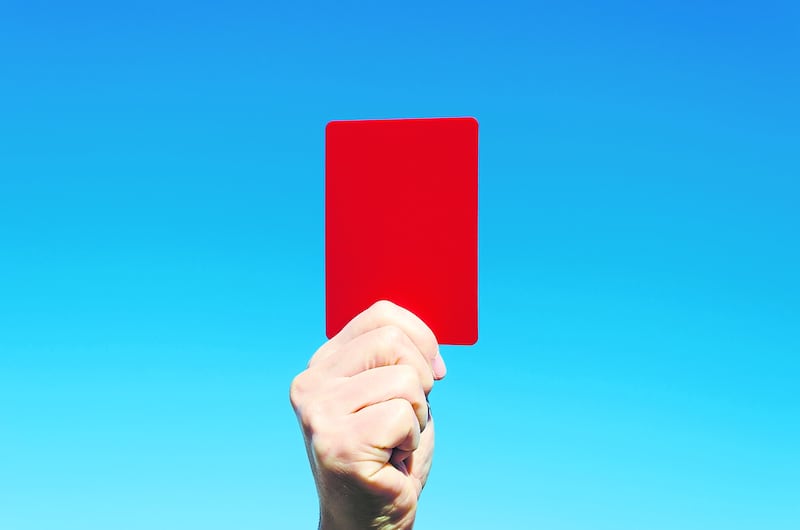Who’d be a referee?
Towards the end of every year there appear stories from county board officials expressing concern about the potential shortage of referees for the forthcoming season.
After a decade or two of seeing those doom-laden warnings, their receipt in newspaper offices is met with cynical comments and eye rolls.
There are always enough referees, we hacks say.
And there always are.
Yet that doesn’t stop the continued appearance of sufficient match officials from being remarkable.
The news broke at the weekend that more than a third of the national panel of inter-county football referees failed fitness tests conducted ahead of the new Allianz Football League season.
The Examiner’s story might have provoked sniggers and sarcastic comments from some supporters, but it should have prompted sympathy.
Referees are being asked to reach professional standards while still largely operating as amateurs. That’s not the slightest slight on them – their efforts are impressive, but refereeing is not their full-time job.
Their hurling counterparts do at least have a little more time to do extra sprints and stamina work before their League begins – and they’ll need to.

There’s a wise old sporting saying, ‘Let the ball do the work’. Yet the size of Gaelic pitches, much larger than their soccer and rugby counterparts, makes life extremely arduous for refs.
The distance a football can be kicked is far enough; a sliotar can go far further, and quicker.
It’s impossible for any referee, no matter how fit and fast, to keep up with play if it’s switched over a long distance. No doubt they’re very grateful for all the hand-passing in football.
As hard as the physical demands of refereeing are, the mental aspect is even tougher.
The scrutiny and commentary of Gaelic games is greater than ever.
Ulster GAA initiative aimed at tackling abuse of referees
‘Something had to be done’ - welcome for jailing of GAA manager who assaulted referee and umpire
Fortunately the splendour of Eanna Burke’s stupendous winning score for St Thomas’ in the All-Ireland Club Senior Hurling Final on Sunday attracted much more attention than some questionable decisions earlier in that game.
After just five minutes a shot from O’Loughlin Gaels forward Owen Wall was carried over his own line by the St Thomas’ full-back – but the umpire standing behind the net didn’t/ couldn’t see that clearly, so the referee could not award the goal/’goal’.
Given that the game ended in a one-point victory for St Thomas’, it can be argued that that error was crucial.
Yet all we definitely know is that O’Loughlin Gaels would have had an early goal on the scoreboard. That might have been the basis for a winning performance from them
It could also have sparked a significant scoring response from St Thomas’.
Calls to bring in VAR to the GAA don’t seem feasible. Yes, perhaps such a system could be put in place at Croke Park but video review would probably turn up even more issues for debate than it settles.
Hurling lets a lot more physicality go than football.
There were several other controversial incidents in the first half alone, a couple of which might have led to red cards, both for O’Loughlins players – a shoulder to the chest, a bash of the helmet.
The one red card that was shown, early in the second half, went to St Thomas’ corner-forward James Regan.
In a sense, those various calls probably evened themselves out over the final.
That’s one reason why the red card for Regan seemed so harsh. Repeated viewings seemed to suggest that there might not have been any contact, but that wasn’t certain either.
O’Loughlin’s midfielder Jack Nolan seemed to contribute to the dismissal with his reaction/ over-reaction. Again, though, we don’t know for certain: a glancing blow could have banged his helmet against his face.
None of this is intended to criticise the performance of match referee Sean Stack.
So much goes on, at such high speed, that it’s obvious some incidents will be missed.
Even those that are seen can be subject to different views.
Eanna Burke could have received a second yellow card early in the second half for chopping down on Jordan Molloy in an attempt to dispossess the wing-back.
Referees have to make so many judgment calls, instantly, that errors will always occur.
Let me tell you a secret: journalists aren’t perfect either. Sometimes we make mistakes.
A deeper truth – the errors that appear in print or online are only some of those we make on the day. Checks and conversations with colleagues catch most of the howlers, while TV coverage and/or clips shown quickly online can help out too.
While we’re engaging in full disclosure, admit as spectators how many times you get it wrong while watching a match, especially when at the actual game…
One mooted solution is to deploy two referees on the pitch – but if you have two officials you will obviously have two different interpretations of the rules.
Of course, they could convene and discuss contentious decisions but, if they disagree, should they then ‘err on the side of caution’ or go with the stiffer punishment?
Besides, that would require twice as many referees, which is quite the ask, given the demands placed on them.
Thankfully there are still enough men, and increasing numbers of women, willing to put in the hard yards, and do the hardest job on the pitch.
Next year though?


